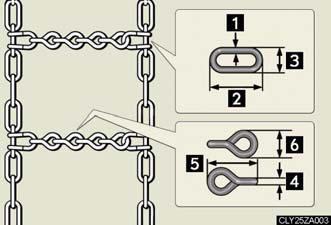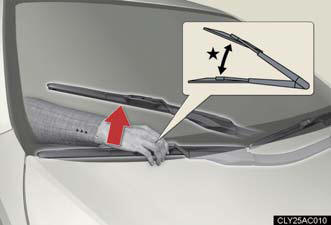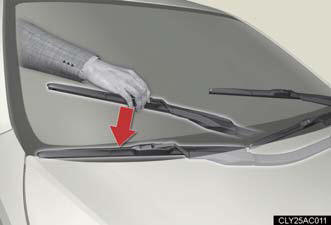Winter driving tips
Carry out the necessary preparations and inspections before driving the vehicle in winter. Always drive the vehicle in a manner appropriate to the prevailing weather conditions.
Pre-winter preparations
l Use fluids that are appropriate to the prevailing outside temperatures.
Х Engine oil.
Х Engine coolant.
Х Washer fluid.
- Have a service technician inspect the level and specific gravity of battery electrolyte.
- Have the vehicle fitted with four snow tires or purchase a set of tire chains for the front tires.
Ensure that all tires are the same size and brand, and that chains match the size of the tires.
- Tire inflation pressure falls in winter as the outside temperature falls. Add 2.9 to 4.3 psi (20 to 30 kPa, 0.2 to 0.3 kgf/cm2 or bar) to the standard tire inflation pressure.
Before driving the vehicle
Perform the following according to the driving conditions.
- Do not try to forcibly open a window or move a wiper that is frozen.
Pour warm water over the frozen area to melt the ice. Wipe away the water immediately to prevent it from freezing.
- To ensure proper operation of the climate control system fan, remove any snow that has accumulated on the air inlet vents in front of the windshield.
- Remove any ice that has accumulated on the vehicle chassis.
- Periodically check for and remove any excess ice or snow that may have accumulated in the wheel well or on the brakes.
When driving the vehicle
Accelerate the vehicle slowly and drive at a reduced speed suitable to road conditions.
When parking the vehicle
Park the vehicle and move the shift lever to P without setting the parking brake. The parking brake may freeze up, preventing it from being released. If necessary, block the wheels to prevent inadvertent sliding or creeping.
Selecting snow chains
Use the correct snow chain size when mounting the snow chains. Chain size is regulated for each tire sizes.

Side chain
1. 0.12 in. [3 mm] in diameter.
2. 1.18 in. [30 mm] in length.
3. 0.39 in. [10 mm] in width.
Cross chain
4. 0.16 in. [4 mm] in diameter.
5. 0.98 in. [25 mm] in length.
6. 0.55 in. [14 mm] in width.
Regulations on the use of snow chains
Regulations regarding the use of tire chains vary according to location and type of road. Always check local regulations before installing chains.
- Install the chains on the front tires.
- Retighten the chains after driving 1/4 - 1/2 mile (0.5 - 1.0 km).
Shifting the windshield wiper position
You can shift the wipers to the rest position manually. (In heavy snow or
icy condition etc.)
Grip the hook section of the wiper arm firmly when shifting the wiper
position.
 To rest position
To rest position

Raise the wiper in line with the windshield.
You can stand the wipers up for the rest position.
*: More than 3.9 in. (10 cm)
 To retract position
To retract position

Lower the wipers by pressing on the upper part of the hook section.
Snow chain installation
Observe the following precautions when installing and removing chains.
- Install and remove tire chains in a safe location.
- Install tire chains on the front tires only. Do not install tire chains on rear tires.
- Install the tire chains on front tires as tightly as possible. Retighten
chains after
driving 1/4 - 1/2 mile (0.5 - 1.0 km).
- Install tire chains following the instructions provided in the accompanying instructions.
CAUTION:
Driving with snow tires
Observe the following precautions to reduce the risk of accidents.
Failing to do so may result in a loss of vehicle control and cause death or
serious
injury.
- Use tires of the size specified for your vehicle.
- Maintain the recommended level of air pressure.
- Do not drive in excess of 75 mph (120 km/h), regardless of the type of snow
tires
being used.
- Use snow tires on all, not just some wheels.
Driving with snow chains Observe the following precautions to reduce the risk of accidents.
Failing to do so may result in the vehicle being unable to be driven safely, and
may
cause death or serious injury.
- Do not drive in excess of the speed limit specified for the tire chains being
used,
or 30 mph (50 km/h), whichever is lower.
- Avoid driving on bumpy road surfaces or over potholes.
- Avoid sudden turns and braking, as use of chains may adversely affect vehicle handling.
- Slow down sufficiently before entering a curve to ensure that vehicle control
is
maintained.
NOTICE:
Repairing or replacing snow tires
Request repairs of and obtain replacement snow tires from Lexus dealers or
legitimate
tire retailers.
This is because the removal and attachment of snow tires affects the operation
of
the tire pressure warning valves and transmitters.
Fitting tire chains
The tire pressure warning valves and transmitters may not function correctly
when
tire chains are fitted.
See also:
INTERIOR
The interior of the RX 350 is surprisingly understated and simple. The wood
trim looks nice, but the black- and silver-colored plastic surfaces could have
appeared more upscale.
After testing a ...
Chassis/Body/Suspension/Tires/Brakes
The 2010 Lexus GX 460 is one of the few premium brand luxury utility vehicles
that can deliver genuine trail driving capability. Combining that capability
with Lexus luxury and on-road performance ...
Tire inflation pressure
Tire inflation pressure
The recommended cold tire inflation pressure and tire size is displayed
on the tire and loading information label.
- Type A
- Type B
Inspection and adjustment procedur ...
